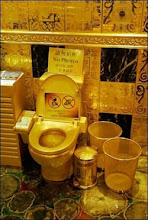
"The Brain" is wobbling. As a champion, throughout the Blair years, of Gordon Brown and his more cerebral approach, his recent fall from grace has been uncomfortable to watch. Once public opinion turns, it's like watching a stunted, anaemic child being ripped apart by a pack of schoolyard bullies.
What really disturbed me though, was Brown's response to the disastrous local elections: the pledge, like that of a beleaguered football manager, that he would "work harder". Brown has, according to observers, raised his already Hurculean workload to truly Stakhanovite proportions. He is reputedly getting by on a spirit-withering, Thatcher-esque four hours of sleep per night.
This desire for hard-graft, for "getting stuck in", is coupled with an obsessive desire to consult the public. Brown recently claimed that Labour's problem was that it hadn't been listening hard enough, and Downing Street advisers clearly agree, having decided that the way to combat Labour's calamitous showing in the local elections is to slingshot the PM into cyberspace, where he will be able to "engage" with those elusive young voters on YouTube:
http://uk.youtube.com/downingst
Gordon Brown recognises that Labour is unwell, but his diagnosis is wrong-headed. If all Brown's "hard work" and engagement with the public is to pay any dividends though, he has to accept that merely refining policy is not enough. He refuses to be drawn into "the politics of personality", but he must accept that Prime Minister is a talismanic position, a figurehead. In The Political Brain: How People Vote and How to Change Their Minds: The Role of Emotion in Deciding the Fate of the Nation, Drew Westen writes persuasively about the preponderent role played by emotion in politics. Both Al Gore and John Kerry lost out to Dubya, Westen claims, because they harped on about policy, fixated by the minor details, whilst Bush made broad-ranging emotional appeals to his audience.

The thing that excited the nation about the New Labour project in the first place was not policy details, it was the emotional charge of it's "narrative" - Britain as a young country, on the cusp of a new dawn, ready to do away with stale grey men in grey suits and embrace the new millennium.



